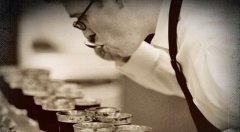The source of coffee temperament: equality and fraternity

There is no doubt that the greatest event of mankind in the first century was the birth of Christianity in the Jerusalem area of Canaan. After more than 200 years of baptism, this product of the Jewish nation's desire for a "savior" ushered in the Milan edict issued by the Roman emperor Constantine, recognizing the legal freedom of Christianity, and then granted the church a series of privileges. Before he died, he was willing to take off his yellow robe and put on a long white coat to be baptized-from then on. Christianity, which was originally rich in color among the people at the bottom, has become the dominant religion in Rome and even Europe. Although very few Europeans have put forward the "Christian origin theory" of coffee and have been refuted by historians (there is an ancient Christian church in Lake Tana, 500 km northwest of the Ethiopian capital Addis Ababa, which is believed by the locals to be the place where the story of the origin of coffee took place), it is clear that the Christian pursuit of equality and fraternity not only became the main thread of European thought, but was later integrated into the coffee culture. I even think that the ultimate way to evaluate a coffee shop is to "taste"; "whether it has the smell of equality and fraternity. In 330, the Roman empire that moved from Rome to Constantinople (formerly Byzantium, now Istanbul) was coming to an end. Perhaps out of fatherly love, Emperor Theodosius, on his deathbed, divided the empire into eastern and western halves and handed them over to their sons. The Western Roman Empire, which returned to Rome, was soon destroyed by the Germans, and the Byzantine Empire (also known as the East Maro Empire), which was the capital of Constantinople, lasted for another thousand years. Although the core interests of Hebi lie in the east: Occupy has hardly been regarded as an authentic European country, the millennium from the Roman Republic to the demise of the Western Roman Empire is the ancient history of Europe, and the next millennium in which Byzantium continues to exist is the "Dark Middle Ages". But the Byzantine Empire itself regarded itself as the only authentic inheritance of the Roman Empire-the pure successor of Christian lineage.
In 800, the Byzantine emperor was stripped of his church by the pope and the Charlemagne Empire was established. Charlie was crowned emperor of Rome by the pope and became the only monarch in Europe who believed in Roman Christianity. I think the greatest advantage of the endless struggle between religious power and imperial power in Europe is that it avoided the integration of politics and religion in Ohuanzhou in the Middle Ages, and no matter how powerful the imperial power and no matter how powerful the knights were, they did not have the courage to break with the church. This also laid the foundation for the coffee blossom, which represents freedom and democracy.
Important Notice :
前街咖啡 FrontStreet Coffee has moved to new addredd:
FrontStreet Coffee Address: 315,Donghua East Road,GuangZhou
Tel:020 38364473
- Prev

The first seed of Coffee Spirit: treat the World as your hometown
In 330 BC, Alexander realized the great integration of the East and the West for the first time by virtue of the Macedonian phalanx and the pride of taking the world as his hometown. At that time, coffee had not yet been born, but the spirit of coffee had planted the first seed. Two hundred years later, Caesar and his successor Octavian brought Rome from the era of the Republic to the age of the Empire. After iron blood and flowers, Wenzhi and crusade, Pang Dadi at the end of the 2nd century
- Next

Coffee History Chronicle the time when the coffee fruit was found in Ethiopia
Coffee fruit was found in Ethiopia in the 6th and 7th centuries; Rhazes, a famous doctor in the Arab region in the 10th century, was considered to be the first person in history to record coffee in the literature; 1100 yuan, the first recorded coffee trees were planted in the Arabian Peninsula, after roasting and cooking, coffee was called Gahwa, meaning Islamic wine; in the 13th century, people
Related
- How did the Salvadoran coffee industry develop in Central America?
- What exactly does the golden cup extraction of coffee mean?
- The Origin of Coffee flower
- [2023 Starbucks World Earth Day] there are more meaningful things besides free Starbucks coffee!
- What kind of coffee is there in Spain? 9 Flavors of Spanish Coffee
- Aromatic African coffee| Kenya's coffee culture and historical production area
- Liberica Coffee Bean knowledge: the characteristics of Liberian Coffee beans of the three original species of Coffee beans
- The origin and formula of Spanish latte introduces the taste characteristics of Bombon coffee in Valencia, Spain.
- How to adjust the solution of over-extracted coffee
- What is the tasting period of coffee beans? What is the period of coffee and beans? How should coffee wake up and raise beans?

